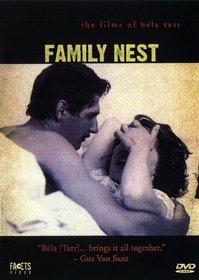| Actor: Laszlo Horvath Director: Bela Tarr Genres: Indie & Art House, Drama Sub-Genres: Indie & Art House, Drama Studio: Facets Format: DVD - Black and White - Subtitled DVD Release Date: 06/28/2005 Release Year: 2005 Run Time: 1hr 40min Screens: Black and White Number of Discs: 1 SwapaDVD Credits: 1 Total Copies: 0 Members Wishing: 6 MPAA Rating: NR (Not Rated) Languages: Hungarian Subtitles: English |
Search - Family Nest on DVD
  | Family Nest Actor: Laszlo Horvath Director: Bela Tarr Genres: Indie & Art House, Drama NR 2005 1hr 40min In this gritty family drama, a young couple are forced to live with the husband?s parents in a one-room apartment because of the housing shortage faced by most Eastern European countries under communism. The proximity of t... more » |
Larger Image |
Movie DetailsSimilar Movies
|
Movie ReviewsFamily Affair Alex Udvary | chicago, il United States | 10/19/2006 (4 out of 5 stars) "Some movies come along and shock us with their realism. We often complain that events that happen in the movies cannot happen in real life. Everything ends too perfectly. The lovers always kiss and make up in the end. We sit and watch and say to ourselves "yeah right"! Some filmmakers have went against the tide though. John Cassavetes comes to mind and his films "Faces" and "A Woman Under the Influence" but you need to add another name to that list, Hungarian filmmaker Bela Tarr. Bela Tarr's debut film is perhaps one of the all time great debut films. Tarr, for those who don't know his name, is one of the most uncompromising directors to come out of Eastern Europe. He shoots his films in black and white, takes long unbroken camera shots, his work is usually compared to Tarkovsky and Antonioni for this reason and his films slow pace. Some of his major films include "Santantango" and "Damnation". In "Family Nest" though none of his usual characteristics are present. Yes the film is shoot in black and white but the movie does not have the long uncompromising camera shots if anything the film resembles the work of Cassavetes who clearly inspired this film. And I think Cassavetes inspired his other film "The Prefab People". "Family Nest" has so many moments where I found myself able to relate to the characters onscreen that it is unlike any other film I have seen in recent times. The plot is not that complex. It is rather straight forward. Iren and Laci, a married couple with a daughter, are having problems after Laci returns home from the army. Iren and her daughter have been living with Laci's father, which already has too many people living in it. The couple wants to get their own place but soon Laci's father starts to question Iren about whether or not see has been faithful to his son. Tarr doesn't heistant to show these characters bad sides. He's not trying to make a "pretty" film. He's trying to show the hardships of family life and married life. Things are not always perfect. Sometimes people corrupt our minds when there was nothing there to corrupt, but, that's life. Even though this film doesn't resemble Tarr's later films, at least as far as style goes, it still ranks as one of his greatest films. All Bela Tarr fans should make an effort to see it. Bottom-line: One of Bela Tarr's best films. "Family Nest" is an uncompromising look at family and married life. The movies does not hold back but tries to present an accurate picture of a modern family and succeeds in showing us the movies are sometimes capable of displaying real people with real problems we, as an audience, can relate to." Reconceptualizing what cinema can do Farffleblex Plaffington | Parnybarnel, Mississippi | 04/04/2008 (5 out of 5 stars) "Családi tüzfészek (aka Family Nest) is an intimate portrayal of a family slowly disintegrating under various pressures in late 1970s communist Hungary. The plot of the film is deceptively simple, with the occasional momentous event--including one that's relatively shocking, but plot in a conventional sense is not the focus here.
What makes Family Nest so masterful is director writer/director Béla Tarr's skill at suggesting layers of emotion, commentary and meaning through cinematography and staging. For example, early in the film there is an extended scene of the family that is the film's focus eating dinner in their crowded apartment with some friends. Tarr has the camera crammed in a small room with the cast, necessitating that almost the entire scene is shot in close-ups. There are numerous conversations and an increasing amount of bickering occurring simultaneously. The viewer cannot escape a sense of claustrophobia and chaos. Later in the scene, Tarr trains his camera on the family's television, which is showing a news story about communism. There is irony between the ideological foundations necessary for communism and what we see occurring among just this one small group. As the film progresses, Tarr treats us to many more ironies and juxtapositions, such as the overbearing father's distorted view of his sons versus their "true nature", a carnival versus addiction and sickness, and the futility of government housing policy versus the practical requirements for keeping a husband and wife together. Some scenes--and especially the final two shots, last far longer than many viewers will be accustomed to, but through such unusual techniques, Tarr manages to "dig in" to emotional and dramatic spaces that could not otherwise be reached. Like much of his work, it suggests a reconceptualization of what cinema can do and how it can do it." |





